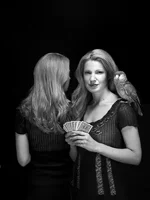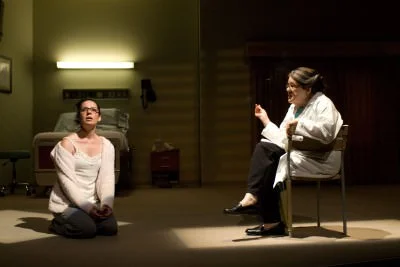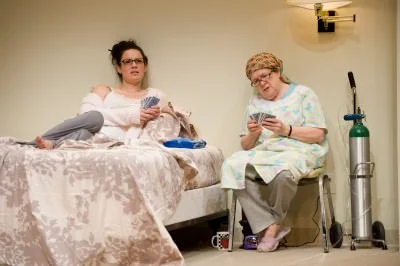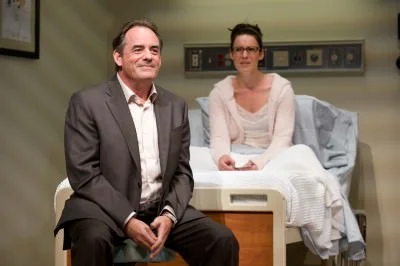A Parallelogram
A new play by Bruce Norris
Directed by Anna D. Shapiro
At Steppenwolf Theatre
Witty domestic drama laced with major philosophical questions
If someone could tell you in advance exactly what was going to happen in your life, and how everything was going to turn out, and if you knew you couldn’t do anything to change it, would you still want to go on with your life?
That’s the key question asked by Bee, the central character in Parallelogram, and it provides the theme of this remarkable, thought provoking play.
Well, one thing is certain. If I knew in advance that I could relive these moments and see this play again, I would jump at the opportunity and gladly revive the experience. Parallelogram deserves more than one viewing, and – because the play is filled with amazing twists and turns, punctuated with clever surprises — it could and would be fully enjoyed innumerable times.
Four characters engage in a deceptively simple – yet delightfully ambiguous – plot. Bright, articulate Bee (Kate Arrington) believes that she can foretell the future and hopes that with this knowledge she can skirt personal and world disaster. She is joined (or is haunted) by her much older (real or imagined) self, Bee 2 (Marylouise Burke), a catalyst who can reveal the past and the future merely by pointing a TV remote control. When young Bee wishes to change outcomes, she persuades Old Bee to point that control and push a button. The results are life relived — neatly repeated scenes reenacted by Bee’s lover Jay (Tom Irwin) and JJ, the “lawn boy” (Tim Bickel).
Kudos to Irwin, who so skillfully recreates scenes with exactly the same gestures and nuances. And high praise also for great comic moments in a scene where Jay fails to hear Bee 2 insulting him. The timing of the dialogue – the repeated insults, which Jay misses while Bee not only hears but encourages — is hilarious.
Arrington, sitting amid the tumbled linen of various beds, gives a vivid performance, forever keeping the audience wondering whether her character’s conclusions are based on reality or stem from either psychological or physiological conditions – or both.
Burke nearly steals the show as the elderly Bee 2 when she “turns off” the action to address the audience directly. At one point, she announces that we have already lost 31 minuses of our lives – time that can never be retrieved. At other moments, she regales us with odd non-sequiturs and seemingly irrelevant tales.
Under Anna D. Shapiro’s fine direction, the four characters brilliantly play off against each other with the women maintaining a nearly constant stream of dialogue while the men come and go — always revolving around them: captive satellites. All takes place within Todd Rosenthal’s cleverly morphing stage sets as they shift between the present and potential futures.
Playwright Bruce Norris provides additional layers of meaning and enjoyment as, for example, in his many seemingly unrelated but actually integral references to birds. Bee owned a parrot that bit her when she was a child. Later Jay’s daughter is bitten by another parrot that Bee that sends as a gift. Several times, references are made to earlier, happier days when Bee and Jay went on a holiday and enjoyed watching a little green finch hiding in their sugar bowl. Bee 2, tells a tale of a bird virus plague wiping out the world And then, there is the name Jay, itself.
In addition, and more pointedly, an empty birdcage dominates center stage for most of Act I. Having formerly housed Bee’s pet (now dead), it becomes both symbol and microcosm of Bee’s own life. She herself is living in a cage – and her attempts to alter the future reinforce the theme of free flight and self-determination.
The play itself soars, with never a dull moment. Plot threads offer unending provocative parallels that make a perfect springboard for discussion. Steppenwolf provides this opportunity with post-show sessions following each performance. They are well worth attending.
Parallelogram concludes Steppenwolf’s season of belief, a series of plays where characters explored their particular and unique versions of reality, and provides a brilliant climax to the season.
Highly Recommended
Beverly Friend
At Steppenwolf Downstairs Theatre, 1650 N. Halstead, www.steppenwolf.org, 312-335-1850, tickets $20-$70, runs Tuesdays through Sundays at 7:30 p.m., Saturday and Sundays at 3 p.m., Wednesday at 2 p.m. Running time is 2 hours with a 15 minute intermission, through August 29




